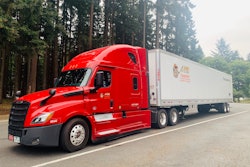Trucking news and briefs for Wednesday, March 10, 2021:
The state of ‘ugly’ bills that could hit trucking in Washington state
Given the geopolitics of Washington state, Sheri Call, executive vice president of the Washington Trucking Associations, often finds herself between her state’s legislative moves to follow in the footsteps of a bigger sibling to the south, California, and protecting the interests of her state’s member carriers.
Once again, that’s exactly where she was when CCJ touched base with Call late last week. “We’re really fighting some truly ugly bills right now,” she said. Ones in which the skids are greased and the state legislature is moving quickly on their potential passage include an emissions law that she said will cause diesel prices to spike, and one that likely would lead to a spike in petty lawsuits brought against trucking companies.
We originally contacted Call to talk about the issue of a nationalized ABC test law in the works in the U.S. Congress, given WTA’s ongoing work to fend off a state-level ABC test law in recent years and get her take on how such laws impact trucking companies large and small, as well as owner-operators that run under the authority of a larger carrier.
But fending off the two more pressing pieces of legislation in her state was top of mind.
The first is House Bill 1091, which seeks to enact a low-carbon fuel standard mandate in the state, targeting transportation fuels like diesel and gasoline. The bill passed the state’s House for the fourth straight year last weekend and is set to enter the hearings process in the state Senate this week.
RELATED: West Coast fleets high on benefits of renewable diesel but low on supply
It follows low-carbon standards enacted in California, which the California Air Resources Board hails as a success in cutting greenhouse gas emissions. Likewise, proponents of Washington’s bill argue it will provide opportunities for those in rural Washington to develop bio-fuel production and help lower greenhouse gas emissions in the state by driving quicker adoption of electric and other alternative fuels.
However, Call contended, while potentially well-intentioned, the bill would cause diesel prices to spike in the coming years by an estimated 63-cents per gallon on average by 2030, and the burden of the bill’s goals would fall on trucking to bear. “It will raise consumer prices, because most segments of the industry have mechanisms to pass along these costs of increased fuel,” she said. “It’s a serious issue.”
A group of independent owner-operators last year staged a protest outside the capitol in Olympia over the fuel standards, helping sway the state’s Senate away from passing the bill. This year, Call is hoping they can delay the legislation another year. “I’m not sure what the outcome will be,” she said. “Will it be similar to last year? Or have things changed in the legislature?”
House Bill 1076 is another “of big, big concern," said Call, "not just for trucking, but across the board,”
She said the bill would deputize employees to sue their employers on behalf of the state if they see workplace violations taking place. Similar legislation in California has caused a “surge in lawsuits that tend to be frivolous in nature,” Call said. How many of those have targeted trucking companies is not clear, she said, but the bill appears to be a boon for trial attorneys.
For Washington, the state relies on an arbitration system within its Department of Labor to adjudicate workplace disputes. That system isn’t at capacity, she said, meaning there seems to be no reason for the bill’s enactment. “It’s just ugly stuff,” she said.
Oregon lawmaker wants to ban sale of diesel
A bill introduced in the Oregon House of Representatives would ban the sale of diesel fuel in the state by 2028. Rep. Karin Power, of Milwaukie, Oregon, introduced the bill on March 2. If passed, it would be phased in over several years, beginning in 2024.
The first phase, which would take effect Jan. 1, 2024, would ban the sale of petroleum diesel for nonretail dealers located in Clackamas, Washington and Multnomah counties in the Portland area. The second phase would ban retail sales in those three counties by Jan. 1, 2025.
The third and fourth phases would take effect in 2027 and 2028 and would prohibit nonretail and retail dealers from selling petroleum diesel anywhere in the state.
Jana Jarvis, president of the Oregon Trucking Associations, said the bill is an effort to push renewable diesel fuel in the state, but on such a short timeline, she said it would be difficult to achieve.
“The problem for us is there simply isn’t a supply of renewable diesel,” she said. “Titan Freight has a supply, but other carriers can’t access it. It’s questionable why we would mandate a fuel that’s in short supply when our carriers can’t access it.”
See more about Titan Freight’s move to renewable diesel from CCJ Senior Editor Aaron Huff here.
Jarvis added that much of the premise of the legislation and its short timeline is an assumption that there will be a renewable diesel facility in Oregon.
“Some question if that will happen, and if it does, whether supply will be available in Oregon,” she said. “The subsidies are not as good in Oregon as they are in California because Oregon isn’t as well-funded as California. There’s just not as much to work with here. We are not one of the world’s biggest economies.”
Another issue Jarvis noted with renewable diesel supply is that it is produced from feedstocks like animal fats and vegetable oils, often from the restaurant industry.
“With the shutdown of restaurants in many parts of the country, feedstocks are limited,” she said. “There is trouble manufacturing renewable diesel right now with COVID.”
Ultimately, Jarvis believes renewable diesel will be a good product to reduce carbon emissions, but right now, “a limited supply so far for [House Bill] 3305 to mandate it as a fuel source is certainly questionable.”
In addition to the trucking industry in Oregon being wary of the legislation, the Oregon House Republican Caucus is also strongly opposed to the bill.
“I’m not sure where to begin with this bill,” said Rep. Shelly Boshart Davis of Albany. “Our entire economy depends on the free flow of freight by both truck and rail, nearly all of which is powered by diesel engines. There is simply no commercially available, cost-effective alternative to transporting these goods. Of course, the impacts of this bill go well beyond just trucking and freight and would destroy any and every industry that relies on heavy equipment, render tens-of-thousands of personal vehicles inoperable and put countless Oregonians out of work.”
No action has been taken on the bill as of Tuesday morning, and it is currently awaiting referral to committee. –Matt Cole
Axele TMS adds features to support team drivers, terminals
Transportation management system provider Axele has added Teams and Terminals functionality to its system to provide support for team drivers to keep loads moving and stay on the road longer, and to help larger carriers better manage regional bases.
The Axele Teams feature allows dispatchers and trip planners to visualize drivers’ schedules, seeing solo and team drivers on a weekly chart to ensure proper load assignment. The TMS integrates hours of service data from ELDs, so dispatchers and schedulers can see the availability of all drivers and teams.
The Terminals feature supports regional terminals, allowing carriers to create individual terminal profiles with company, drivers, tractors, trailers, DOT number, MC number and more. Once the planner establishes a terminal, the carrier can assign loads by terminal, track activity by terminal, pay drivers by terminal, monitor invoices by terminal and see trends or analytics by terminal.
CVTA names new president
The Commercial Vehicle Training Association announced that A. Bailey Wood Jr. has been appointed president and CEO of the organization.
Wood has deep ties to the transportation industry, in Congress and with the executive branch. Earlier in his career, he served as legislative assistant to the Committee on Education and Workforce; press secretary for three members of the House Representatives; communications director for the House Committee on Homeland Security; and with his most recent position, director of communications for the U.S. DOT Federal Transit Administration.
He has also served as senior director of the National Automobile Dealers Association, where he successfully lobbied for several major national initiatives and served as the lead policy communicator for one of the nation’s largest and most influential trade associations.












